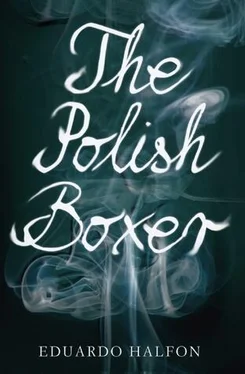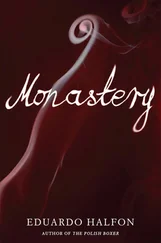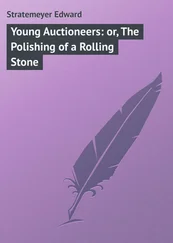Eduardo Halfon - The Polish Boxer
Здесь есть возможность читать онлайн «Eduardo Halfon - The Polish Boxer» весь текст электронной книги совершенно бесплатно (целиком полную версию без сокращений). В некоторых случаях можно слушать аудио, скачать через торрент в формате fb2 и присутствует краткое содержание. Год выпуска: 2012, Издательство: Bellevue Literary Press, Жанр: Современная проза, на английском языке. Описание произведения, (предисловие) а так же отзывы посетителей доступны на портале библиотеки ЛибКат.
- Название:The Polish Boxer
- Автор:
- Издательство:Bellevue Literary Press
- Жанр:
- Год:2012
- ISBN:нет данных
- Рейтинг книги:4 / 5. Голосов: 1
-
Избранное:Добавить в избранное
- Отзывы:
-
Ваша оценка:
- 80
- 1
- 2
- 3
- 4
- 5
The Polish Boxer: краткое содержание, описание и аннотация
Предлагаем к чтению аннотацию, описание, краткое содержание или предисловие (зависит от того, что написал сам автор книги «The Polish Boxer»). Если вы не нашли необходимую информацию о книге — напишите в комментариях, мы постараемся отыскать её.
marks the debut of a major new Latin American voice in English.
The Polish Boxer — читать онлайн бесплатно полную книгу (весь текст) целиком
Ниже представлен текст книги, разбитый по страницам. Система сохранения места последней прочитанной страницы, позволяет с удобством читать онлайн бесплатно книгу «The Polish Boxer», без необходимости каждый раз заново искать на чём Вы остановились. Поставьте закладку, и сможете в любой момент перейти на страницу, на которой закончили чтение.
Интервал:
Закладка:
Lía glanced at the postcard, said Goofy had always been her favorite, and then asked me sweetly, as if it was nothing, if Franz Liszt hadn’t been an anti-Semite.
The second postcard from Orlando was titled Liszt II. It was another Donald Duck drawing, but this duck was dressed as a painter or a bricklayer, maybe — it wasn’t too clear. Milan wrote: The day of the competition arrives. Josy is ready. When it’s finally his turn, he begins to play beautifully, a virtuoso, a child prodigy, but then suddenly, for no apparent reason, he begins to improvise. The judges disqualify him. Josy is furious and disappointed and runs off. Back at home, Liszt sits before the piano and, still moved by the Gypsy boy’s music, composes a piece, one of his Hungarian Rhapsodies, I think, without realizing the influence Josy’s music has had on him. Count Teleky points this out, but Liszt resents the idea that he might have needed any Gypsy influences to finally become a true composer. Liszt accepts that he has lost the bet. Josy leaps into the room. He’d been spying on them through the window, from the garden. He accuses Liszt of using him just to win a bet, and no matter how Liszt tries to make him see that he has a magical ability to capture the true spirit of music, Josy says they come from two different worlds that will never meet. The movie, in my opinion, should have ended there. Though perhaps not. I don’t know. At any rate, Liszt rushes off to the Gypsy camp and returns with all of Josy’s family and friends. He wants the boy to play his own music, with his own people, for Liszt’s guests. Josy is upstairs. He refuses to come down. Slowly, the Gypsy music begins. Everyone shouts and sings and dances. Josy can’t deny his true character and descends the stairs, picks his old violin up off the floor, and joins in the Gypsy revelry. Everyone applauds. Bravo. Liszt has accepted the Gypsies and has also accepted the spirit of Gypsy music and everyone’s happy and the world is fucking peachy and that’s the end. Do you understand?
I got a postcard that should have arrived much earlier, lost for a time in the hidden recesses of Milan’s subconscious or perhaps in the hidden recesses of the post office’s labyrinthine inefficiency, or both. The postmark said Savannah, Georgia. It was a sepia-colored photo of two elderly black men, solemn and looking preserved in a sweltering vat of muggy air. They were on the porch of a stately old southern home, relaxing in wooden and wicker rocking chairs and sipping lemonade or perhaps iced tea. Also on the porch were a brown cat and a porcelain pot, probably a spittoon. One of the old men had a peg leg. Milan wrote: Ciganin, that’s what they called me at school. It means Gypsy, in Serbian. Ciganin. Or sometimes Cigo. Cigo, and then they’d call me names or throw rocks at me or give me a kick in the ass. To Serbs I’ve always been a piece of shit Gypsy, a filthy good-for-nothing Gypsy. And to Gypsies I’ve always been a piece of shit gadje, a piece of shit non-Gypsy. My mother’s family rejected us. My father’s family rejected us. I’m a Gypsy who can’t be a Gypsy and a Serb who can’t be a Serb. What’s a boy to do, Eduardito, when he’s excluded by one group and excluded by the other and detested by both? He withdraws, that’s what he does. He retreats into himself. And that, no doubt, is my greatest talent. Not music, but the ability to close myself off, ignore people and, what’s more, get people to ignore me. It’s not that I become invisible, as invisibility still implies presence, observation, being a witness, even if a distant, disinterested witness. I can absent myself entirely. Eliminate myself entirely. Not like a corpse, but more like someone who never existed. A world without me.
Maybe because of the photo of the two elderly black men, maybe because of the confessional tone Milan used, this was Lía’s favorite postcard. She would come into my studio and, lighting the obligatory cigarette, contemplate it for a long time as though contemplating something sacred, something mysterious, something that was in fact something else or at least seemed to be something else.
Gyorgy, read the title on the next postcard, a very large postcard of the London Underground logo. In minuscule letters, Milan wrote: Last year the body of a Gypsy trumpeter named Gyorgy Krompachy turned up floating in the Copşa Mică River, in Romania. No one knows why. I’d met him at a weeklong Gypsy music festival in Lucerne. Even though he was my age, he looked much older. He smoked a mixture of hash and tobacco and drank vodka from a rusty canteen. He said vodka was good for playing in seven-eight time, whiskey was good for playing in six-eight, absinthe for playing in nine-eight. I think he was right. Though he was born in Bulgaria, he didn’t consider himself Bulgarian. He’d hop around from Serbian bands to Macedonian bands to Romanian bands to Turkish bands without thinking twice, as if they were modern versions of kumpanias or the caravans of his ancestors. But what he liked to play best, he said, were Serbian kolos, very fast circular dances that were really intense and made him feel, he said, as though he had a very high fever. Similar to Jewish dances. With overstated pride, Gyorgy told me he’d made a brief appearance in the bunker scenes of the Emir Kusturica movie Underground “(I thought of him, Eduardito, when I bought this postcard a few weeks ago). I didn’t believe him, of course, though a long while later I discovered it was true. There he was, Gyorgy Krompachy, smiling and composed and playing his trumpet on top of the spinning cake when the bride goes flying over them. The last night of the festival, after playing a couple of čočeks with Kočani Orkestar, a band from Macedonia, Gyorgy asked me to accompany him to the outskirts of town, on an errand. He was dressed in black, with a sparkling green vest and sparkling white shoes. First, we went to a bar, where Gyorgy had one vodka, and then another vodka, and then, in exchange for a few bills, pawned his trumpet. I remember that before he handed it over, he showed me the inside of its black case, papered over with naked ladies, all Asian. After that, we went to a little shack of mud and corrugated metal, in the middle of nowhere. A Gypsy woman, maybe forty or fifty years old, opened the door. She had gold teeth. Smelled bad. Gyorgy gave her the money and the woman, smiling maliciously, closed the door. That was it. We walked back to the festival tents, with Gyorgy smoking his tobacco and hash and going on and on about Thai vaginas and how enormous they are. The next day, when I woke up he’d already left.
I got a postcard of the streets of New York City. In Central Park, a couple of perfect models with perfect tans skated into a perfect sunset. Milan wrote: Some time ago, Félix Lajkó, the most famous Gypsy violinist from Novi Sad, was passing through town. He played in Madison Square Garden. After the concert, several of the Serbian artists living in Manhattan decided to take him out to dinner. Writers, painters, a filmmaker. I didn’t say a word the whole night. I spent two hours sitting next to one of my idols, in the most absolute silence, petrified. When the coffee was finally served, Lajko turned to me and said that he knew an accordionist whose last name was Rakić who was also from Belgrade, and maybe he was family. Without looking up from my espresso, I whispered that no relative of mine was an accordionist in Belgrade. And that was it.
I got a postcard of a cowboy on horseback, from San Antonio, Texas. Milan wrote: Long, long ago, the Gypsies built a church of stone and the Serbs built a church of cheese. When each of the churches was finished, they decided to swap. The Gypsies would give the Serbs the church of stone, and the Serbs would give the Gypsies the church of cheese, plus five cents. But as the Serbs had no money, they still owed the Gypsies the five cents. Immediately the Gypsies began to eat their church of cheese, and little by little they polished it off. And then they had no church. The Serbs still owe the Gypsies five cents, and the Gypsies still demand it every day. I think the time has come, Eduardito, to settle that five-cent debt with myself. Tshiocha, I cry, like that beautiful black Welsh woman.
Читать дальшеИнтервал:
Закладка:
Похожие книги на «The Polish Boxer»
Представляем Вашему вниманию похожие книги на «The Polish Boxer» списком для выбора. Мы отобрали схожую по названию и смыслу литературу в надежде предоставить читателям больше вариантов отыскать новые, интересные, ещё непрочитанные произведения.
Обсуждение, отзывы о книге «The Polish Boxer» и просто собственные мнения читателей. Оставьте ваши комментарии, напишите, что Вы думаете о произведении, его смысле или главных героях. Укажите что конкретно понравилось, а что нет, и почему Вы так считаете.












